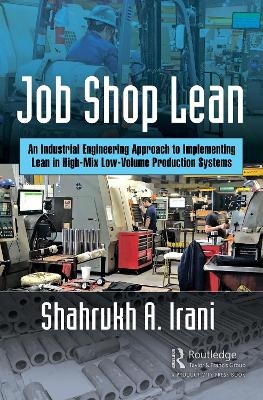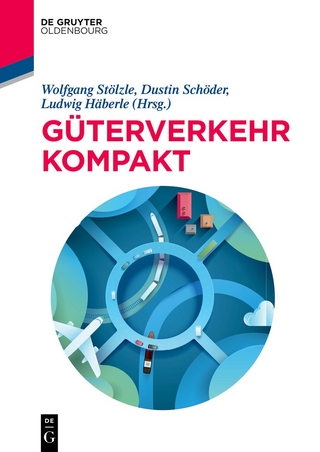
Job Shop Lean
Productivity Press (Verlag)
978-1-4987-4069-2 (ISBN)
- Titel z.Zt. nicht lieferbar
- Versandkostenfrei innerhalb Deutschlands
- Auch auf Rechnung
- Verfügbarkeit in der Filiale vor Ort prüfen
- Artikel merken
In the 1950’s, the design and implementation of the Toyota Production System (TPS) within Toyota had begun. In the 1960’s, Group Technology (GT) and Cellular Manufacturing (CM) were used by Serck Audco Valves, a high-mix low-volume (HMLV) manufacturer in the United Kingdom, to guide enterprise-wide transformation. In 1996, the publication of the book Lean Thinking introduced the entire world to Lean. Job Shop Lean integrates Lean with GT and CM by using the five Principles of Lean to guide its implementation: (1) identify value, (2) map the value stream, (3) create flow, (4) establish pull, and (5) seek perfection. Unfortunately, the tools typically used to implement the Principles of Lean are incapable of solving the three Industrial Engineering problems that HMLV manufacturers face when implementing Lean: (1) finding the product families in a product mix with hundreds of different products, (2) designing a flexible factory layout that "fits" hundreds of different product routings, and (3) scheduling a multi-product multi-machine production system subject to finite capacity constraints.
Based on the Author’s 20+ years of learning, teaching, researching, and implementing Job Shop Lean since 1999, this book
Describes the concepts, tools, software, implementation methodology, and barriers to successful implementation of Lean in HMLV production systems
Utilizes Production Flow Analysis instead of Value Stream Mapping to eliminate waste in different levels of any HMLV manufacturing enterprise
Solves the three Industrial Engineering problems that were mentioned earlier using software like PFAST (Production Flow Analysis and Simplification Toolkit), Sgetti and Schedlyzer
Explains how the one-at-a-time implementation of manufacturing cells constitutes a long-term strategy for Continuous Improvement
Explains how product families and manufacturing cells are the basis for implementing flexible automation, machine monitoring, virtual cells, Manufacturing Execution Systems, and other elements of Industry 4.0
Teaches a new method, Value Network Mapping, to visualize large multi-product multi-machine production systems whose Value Streams share many processes
Includes real success stories of Job Shop Lean implementation in a variety of production systems such as a forge shop, a machine shop, a fabrication facility and a shipping department
Encourages any HMLV manufacturer planning to implement Job Shop Lean to leverage the co-curricular and extracurricular programs of an Industrial Engineering department
Dr. Shahrukh A. Irani, PhD, is the President of Lean and Flexible, llc, a consulting company that delivers advisory, training and implementation services focused on Lean for high-mix low-volume manufacturing (aka JobshopLean). Currently, he teaches a 2-semester project-intensive course on Lean Manufacturing in the Department of Industrial Engineering at the University of Houston. From 2012-2018, he was the President of the Houston Senior Chapter of the Institute of Industrial and Systems Engineering. From 2012-2014, he worked as the Director of IE Research at Hoerbiger Corporation of America, Inc. (HCA), Houston, TX. In that position, he gained invaluable industry experience by undertaking projects to demonstrate the viability of JobshopLean in HCA’s high-mix low-volume (HMLV) manufacturing facilities. From 1996-2012, he was an Associate Professor in the Department of Integrated Systems Engineering (ISE) at The Ohio State University (OSU). His research at OSU produced JobshopLean, a comprehensive methodology to adapt Lean for high-mix, low-volume (HMLV) small and medium enterprises (SME). Also, his research team at OSU developed the PFAST (Production Flow Analysis and Simplification Toolkit) software that facilitates the implementation of JobshopLean. During his sixteen years at OSU, he received the Outstanding Faculty Award for excellence in teaching from the ISE department’s graduating classes of 2002, 2003, 2004, 2005, 2006 and 2009 and the 2002 Charles E. MacQuigg Outstanding Teaching Award from the College of Engineering. For 1999-2001 and 2001-2003, he served as the Director of the Facilities Planning and Design (FAPAD) division of the Institute of Industrial Engineers. In 1996, he was voted Young Engineer of the Year by the Minnesota Federation of Engineering Societies and the Minneapolis Chapter of the Institute of Industrial Engineers. Dr. Irani is the Editor of the Handbook of Cellular Manufacturing Systems (1999, John Wiley).
Foreword. Testimonial. Acknowledgments. Author. 1 About This Book. 2 Introduction to Job Shop Lean. 3 Is Job Shop Lean Right for You?. 4 Design For Flow (DFF): The Essential Foundation for Job Shop Lean. 5 Overview of Production Flow Analysis (PFA). 6 Overview of Production Flow Analysis and Simplification Toolkit (PFAST). 7 Functional, Cellular, and Hybrid Cellular Layouts for Any Job Shop. 8 Designing Functional, Cellular, and Hybrid Cellular Layouts for Any Job Shop Using PFAST. 9 How Data Mining Guides Various Production Flow Simplification Strategies. 10 Improving Flow at Any Level in a Factory. 11 Industry Applications of Production Flow Analysis by IE Students. 12 Production Flow Analysis Using Metrics-Aided Visual Assessment of Material Flow Diagrams. 13 Product Mix Segmentation. 14 Determining the Correct Layout Shape for a High-Mix Machining Cell. 15 Lessons Learned from Implementing the Lean Principles in a Single High-Mix Low-Volume Make-To-Order Compressor Parts Machining Cell. 16 How Cell Formation Drives the Implementation of Job Shop Lean. 17 How to Make a Machine Shop Lean and Flexible. 18 How to Make a Custom Fabrication Shop Lean and Flexible. 19 Introduction to Operations Scheduling for High-Mix Low-Volume Manufacturers. 20 Finite Capacity Scheduling of a Flexible and Lean (FLean) Machining Cell. 21 Classroom Tutorial on the Design of a Cellular Manufacturing System. 22 Teaming Industrial Engineers with Employees to Improve a Shipping Department. 23 Implementation of Job Shop Lean in a Forge Shop. 24 Implementation of Job Shop Lean in a CNC Machine Shop. 25 Implementation of Job Shop Lean Using a One-Cell-at-a-Time Approach. 26 Educational and Training Resources for Job Shop Lean. 27 Introduction to Value Network Mapping. 28 Starter Advice for Implementing Job Shop Lean. Index
| Erscheint lt. Verlag | 3.6.2020 |
|---|---|
| Zusatzinfo | 85 Tables, black and white; 60 Illustrations, black and white |
| Verlagsort | Portland |
| Sprache | englisch |
| Maße | 178 x 254 mm |
| Gewicht | 1380 g |
| Themenwelt | Technik ► Maschinenbau |
| Wirtschaft ► Betriebswirtschaft / Management ► Logistik / Produktion | |
| ISBN-10 | 1-4987-4069-3 / 1498740693 |
| ISBN-13 | 978-1-4987-4069-2 / 9781498740692 |
| Zustand | Neuware |
| Haben Sie eine Frage zum Produkt? |
aus dem Bereich


